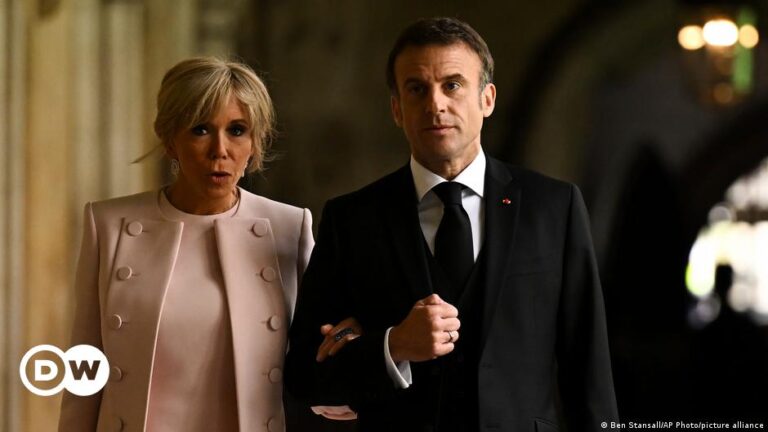The last time a French president paid an official visit to Germany was Jacques Chirac in 2000 – a long time ago, given how close the ties between the two countries are. But this long hiatus has no political significance: after all, the heads of state and ministers of both countries meet regularly every few months.
The focus of the state visit is not politics, but meeting the country and its people. It is organised not by Chancellor Olaf Scholz but by President Frank-Walter Steinmeier. In addition to Berlin, the visit of the President and First Lady will also include stops in Dresden and Münster, where Macron will be presented with the Westphalia International Peace Prize, awarded to “outstanding individuals who have contributed to the unity and peace of Federal Europe”.
French President Emmanuel Macron and his wife Brigitte Macron were actually scheduled to come to Germany last July, but the president canceled the trip due to the unrest in France. However, things are not as calm for President Macron as they are now. The European Parliament elections are just around the corner, and opinion polls suggest that Marine Le Pen’s right-wing populist party, the Rassemblement National, is likely to become the strongest party in France.
Moreover, a Eurobarometer survey conducted in February revealed EU fatigue among the French: the survey showed that the European Parliament, for example, was rated the lowest among the 27 EU member states in France, the very country where the parliament sits and which, together with Germany, is considered the driving force of the EU.
Macron: ‘Europe could perish’
“Our Europe could die,” Macron said a month ago at the Sorbonne University in Paris, provocatively saying it was translated simultaneously into German, as he called for greater European sovereignty and a greater common defence.
This is not the first time Macron has spoken of a grand vision for Europe. He said something similar in 2017 when he called for the creation of a European Finance Ministry, an idea he was rebuffed by Chancellor Angela Merkel of the CDU. Olaf Scholz hailed the speech as a “good impetus” for Europe but did not offer any specific responses.
According to Marc Ringel, director of the Franco-German Institute in Ludwigsburg, it’s also a question of different mindsets. “Vision” is “a very French way of describing a way of looking at things that we don’t see in Germany,” Ringel told DW. “Helmut Schmidt once said: ‘If you have a vision, go to the doctor.’ I think that’s a very German way of saying it calmly.”
German loyalty to the alliance, French autonomy
But there are also clear political differences on many issues now. Paris is committed to nuclear power, while Berlin has closed its last nuclear reactor. Macron has not ruled out sending ground troops to the Ukraine war, but Scholz denies it. Plans for joint Franco-German tanks and fighter jets are moving forward slowly. Macron wants Germany to outsource its weapons programs to French and other European companies, while Germany is content to buy from US companies.
“Defense has always been a point of contention between Germany and France because they have different security cultures,” Ringel said. “The German side is very closely aligned with NATO,” while “France has strategic autonomy that it asserts for itself.”
Scholz in French, Macron in German
Relations between France and Germany are at their worst in decades, Friedrich Merz, leader of the main opposition Christian Democratic Union (CDU), recently complained, and he also said there was a “rift” between Mr Scholz and Mr Macron over aid to Ukraine.
But Scholz and Macron want to at least show the outside world that they understand each other. In a short video posted on X, they do so in each other’s languages. Macron read out a question from a citizen who wanted to know if the Franco-German partnership remains important. Scholz responded in French: “Hello, dear friends, I think so. Long may the friendship between France and Germany last!” Macron replied in German: “Thank you, Olaf. I very much agree with you.”
Active youth exchange
But what about the friendship between the people of France and Germany that goes beyond holidays and red wine? Citing a survey conducted by Infratest in March, Ringel said, “We found that Germans’ approval of France as a diplomatic partner remains high. More than 80% of Germans say that France is a reliable partner, a much higher approval rate than any other partner. The same is true in France.”
But on both sides of the Rhine, fewer people are learning the languages of their neighbours. Former French President Valéry Giscard d’Estaing was once quoted as saying in announcing his intention to resign: “Arrange in English(“English is all you need.”) English being a lingua franca is one thing, Ringel says, but the decline in language learning could also represent a normalization of relationships: “People respect each other, but maybe they’re making a little less effort because they’re getting too familiar with each other.”
In any case, the director of the Franco-German Institute is not particularly worried about the issue of exchanges between young French and German people: “It’s not just exchanges between schools. There are also internship opportunities, for example, with the French Volunteer Service. There are many opportunities to take part in these exchanges and they are very popular.”
This article was originally written in German.
And while you’re here: Every Tuesday, DW editors summarize what’s happening in German politics and society. Sign up here for our weekly email newsletter “Berlin Briefing.”

